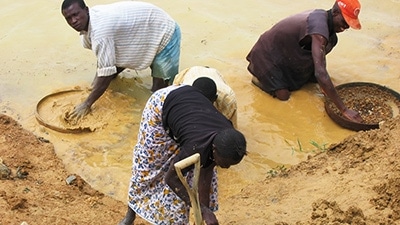
There is a livelihood that has been the bedrock of small-scale mining since time in memorial. The men, women, and children from across the world who wake up eat morning in search of pieces of minerals that promise to change their lives. Ironically though, though the informal nature and on the whole un-mechanized operation that is artisanal mining generally results in low productivity, the sector represents an important livelihood and income source for the poverty affected local population.
One country that has had its fair share of artisanal mining in Brazil. In their article aptly titled “Policies and regulations for Brazil’s artisanal gold mining sector: analysis and recommendations“, Rodolfo Sousa et al. published in the Journal of Cleaner Production stated that “In Brazil, artisanal and small-scale gold mining (ASGM) produces in the range of 6 tonnes of gold (Au) per annum, and employs approximately 200,000 people. Most of this mining activity is in the Amazon region, where miners have been extracting gold for more than 40 years. In the Tapajos River Basin, assessments indicate that around 99% of miners operate without the environmental and mining permits required by law. This is a result of a combination of unrealistic or lack of proper policies and regulations, lack of political will, lack of infrastructure to enforce the existing regulations, and lack of incentives to miners to comply with legal requirements”.
In present-day Zambia, artisanal gold miners who have long been “mining” alluvial gold which can easily be obtained on the surface have been exploited by environmental elements that have taken advantage of the lack of structure around their operations. This includes the lack of security, lack of health and safety mechanisms, lack of a trusted market for the gold, and devoid of traceability among others. These are all factors that make up the fulcrum of sustainable and the now trending ethical mining.
According to mining.com and echoed at this year’s Mining Indaba in February 2020, “the ethics of any business-related operation have never been more in focus and prone to scrutiny – and the natural resources industry is no exception, indeed it should, in principle, be one of the most attentive, given its transformative qualities where landscape and labour are concerned”. What this means is that for artisanal miners in Zambia to carve a roadmap that will see them sit at the same table as the AngloGold Ashanti of this world, there has to be structure in what they are doing.
With the first step being taken by Government to give artisanal miners gold panning certificates to legalise their alluvial or riverbed gold mining activities, the next logical step was to bring forth infrastructure that would enable the transition of the artisanal miners to high yielding mining. This has been made possible by ZCCM Gold which has been established to work with these licenced artisanal gold miners by providing them with gold equipment, access to earth-moving machinery, and offering technical expertise among others.
Source: https://fizambia.com/?p=7205
